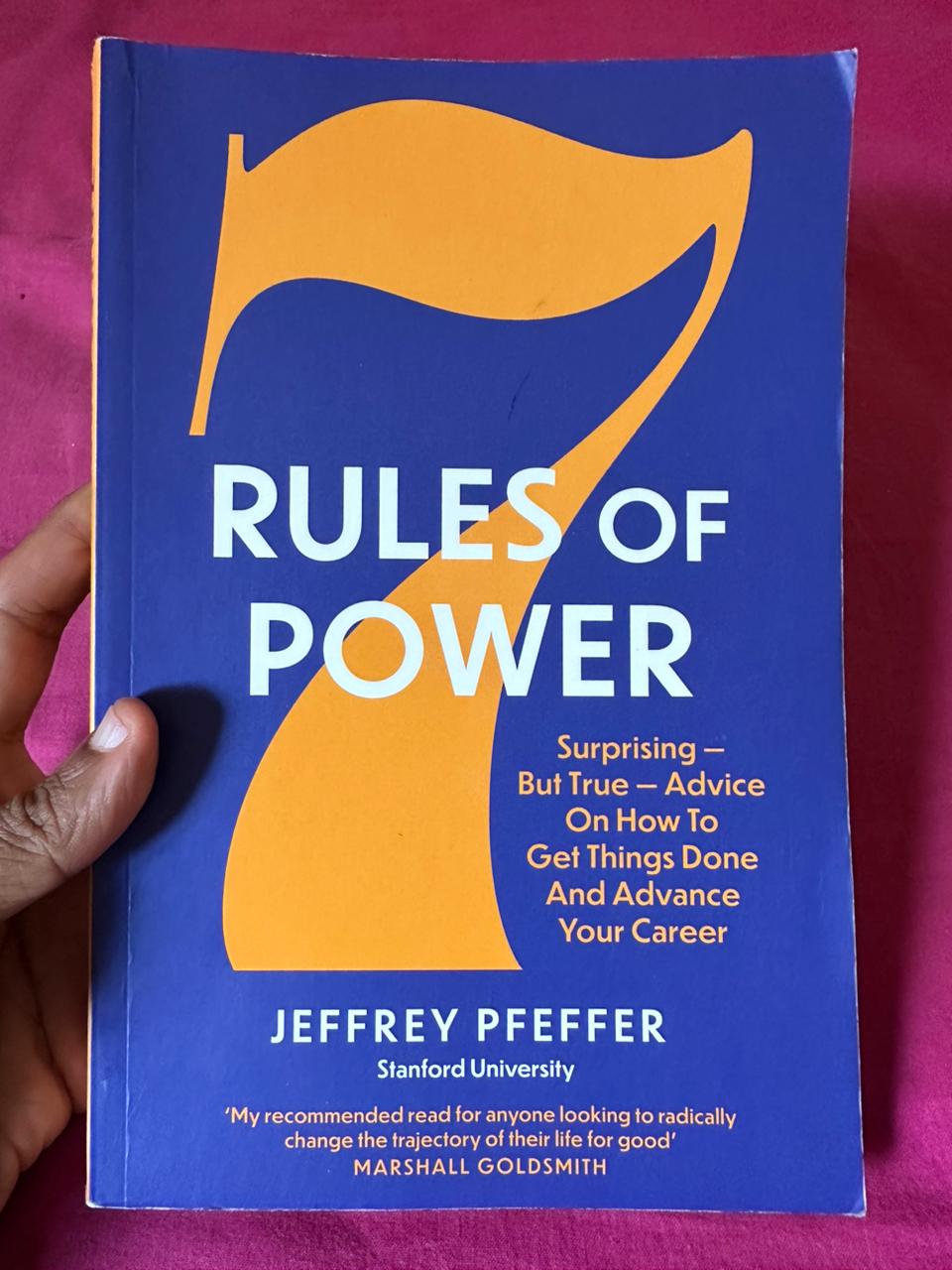
HomeSeven Rules of PowerBook SummarySeven Rules of Power
August 24, 2024
Seven Rules of Power

- BinodShankar
- Book Summary
My top 30 points:
- People shy away from acquiring power, because power is often associated with bad people and terrible things.
- Power is just a tool. It is neutral, with no moral definition. When you confuse how you feel about the use of power with power itself, you do yourself a disservice. You allow others to have power over you because the world is not fair.
- As with power, politics has a negative connotation. Most people will tell you they don’t want to work in a place that has heavy politics. But politics is simply a skill that has to multiple uses, both good and bad.
- Politics is about making connections, understanding people, and working towards objectives. Political skill is one of the most reliable predictors of success in the workplace.
Rule 1: Get Out of Your Own Way
- Your internal self-image has a significant impact on your actions. Negative self-talk can subconsciously undermine your confidence and make you feel small.
- The story you tell yourself about your achievements should not be limited to internal dialogue. Our culture teaches us to downplay our contributions. Communicate your successes and take ownership of your accomplishments.
- You need a powerful network. As a leader, your success depends on your ability to recruit allies and supporters. To accomplish your goals, you need to put yourself in their shoes and ask, “What’s in it for them if they support me?”
- Some behaviors are often emphasized as leadership qualities. But some of these qualities, such as being humble, likeable, and authentic, can be detrimental to building power. These behaviors are more suitable for those who have already achieved power and have to carry public perception.
- Share credit with your team but do not diminish your own role in achieving success. Given the choice between competence and likeability, people will gravitate towards competence first.
Rule 2: Break the Rules
- Rules and social conventions are often created to support those who already have power and maintain the status quo.
- People with power have more freedom to ignore rules. They smile less, interrupt others, and speak loudly because they know they won’t face consequences.
Rule 3: Appear Powerful
- Everybody loves an underdog. But in reality, most people prefer to associate themselves with winners.
- Appearance matters, especially when meeting someone for the first time. People form opinions and make decisions based on their initial impression.
- You may not have earned self-confidence. You may not even feel it yourself. This is the time to fake it until you make it. Acting with conviction can inspire others to follow your lead.
- People subconsciously translate confidence into competence.
- Effective eye contact enhances your credibility and conveys honesty. Perception is key to power, and maintaining steady eye contact for an appropriate duration can create a sense of sincerity and increase your perceived self-esteem.
- Avoid low power behaviors. Apologizing is a good example of this.
Rule 4: Build a Powerful Brand
- Craft your personal story. Just because you are competent and effective doesn’t mean that others will see you that way. Take control of the narrative.
- After you’ve created your story, there are two important things to do. First, internalize your story so you can share it confidently and authentically. Second, tell your story often.
- You might feel that sharing your story is self-promotion, which goes against social norms. Overcome the instinct to be humble. Do not hold back. Recognizing your own value is no different from talking about the value of your team.
Rule 5: Network Relentlessly
- The more people you know and the stronger your relationships with them, the more opportunities you’ll have to advance your career or achieve your goals.
- Many people don’t network much because they feel they’re using others for their own gain and it feels wrong. This belief is limiting- networking is about building a community of mutual support.
- When your job is to get things done, then there is no greater resource than your relationships. Hence networking is a crucial part of your job.
- Four tips: focus on weak ties, become a broker, be a hub of the network and create value for others.
Rule 6: Use Your Power
- When you become a leader, you may want to listen and learn before making any big moves. But waiting too long to take action can be harmful. Seize the opportunity to enact change early in your tenure.
- One way to deal with opposition is to split your efforts between gaining the support of existing team members and bringing in new allies that align with your goals.
- Most people shy away from conflict, so it’s surprisingly easy to accomplish great things by taking the initiative and using your power to get results.
Rule 7: Success Excuses (Almost) Everything
- The winners not only write history but also rewrite it to present their actions and accomplishments in the best possible light. Once in power, people often overlook how it was attained.
- To maintain power, act with confidence and break rules, because powerful people break rules.
- Few powerful individuals have left their mark on history without compromising their values at some point.



